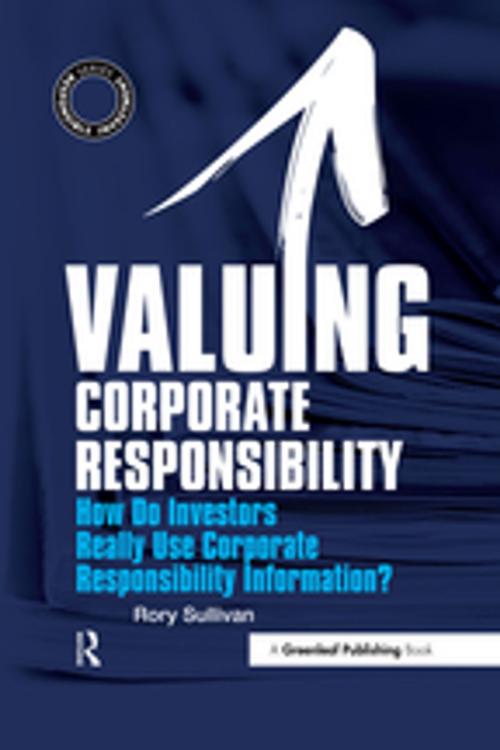Valuing Corporate Responsibility
How Do Investors Really Use Corporate Responsibility Information?
Business & Finance, Business Reference, Business Ethics, Finance & Investing, Investments & Securities| Author: | Rory Sullivan | ISBN: | 9781351278225 |
| Publisher: | Taylor and Francis | Publication: | September 8, 2017 |
| Imprint: | Routledge | Language: | English |
| Author: | Rory Sullivan |
| ISBN: | 9781351278225 |
| Publisher: | Taylor and Francis |
| Publication: | September 8, 2017 |
| Imprint: | Routledge |
| Language: | English |
Investors have taken a long time to pay attention to corporate responsibility. Despite the growing number of companies that were taking action to manage the social and environmental impacts of their activities and operations and that were reporting on their corporate responsibility performance, mainstream investors' interest in governance issues was, on the whole, piqued only in those situations where a major accident or scandal hit the headlines.
This has changed dramatically. With over 600 large investment institutions, including asset managers, insurance companies and pension funds having signed the UN-backed Principles for Responsible Investment, it can now be plausibly argued that "responsible investment" has become mainstream. This change is potentially of huge significance, and the investment community is now widely seen as one of the key audiences for the thousands of corporate responsibility reports produced each year.
Yet the reality is that there is a striking lack of understanding among companies of investors' interests. The consequence has been that, despite many companies identifying investors as one of the critical audiences for their corporate responsibility reports, most investors – even those that have made commitments to responsible investment – see these reports as irrelevant to their investment decision-making. The problem is compounded by the singularly poor job that investors do of explaining to companies what sort of information they are really interested in, and where corporate responsibility performance fits into their overall assessments of companies. This has led to frustrations on both sides. Investors have been accused of not paying sufficient attention to companies' corporate responsibility performance, and companies have been accused of producing information that not only has no immediate relevance to investors but, worse, seems to have no relevance to the key business challenges that these companies face. Valuing Corporate Responsibility aims to address the "dialogue of the deaf" that characterizes too many of the discussions between companies and their investors on corporate responsibility issues, through:
-
Explaining to companies what responsible investment looks like in practice and, from this analysis, explaining what sort of corporate responsibility information investors are interested in and how this information is used in practice.
-
Explaining to investors some of the practical difficulties faced by companies when preparing corporate responsibility reports and the implications for the quality and utility of the data provided in these reports.
Valuing Corporate Responsibility also analyses how issues such as investors' views on materiality and investment time-frames influence the dialogue that investors have with companies on corporate responsibility matters. It concludes that there is a need for a major rethink of current approaches to responsible investment, as the manner in which most investors are implementing their responsible investment commitments is unlikely to see them making a substantial contribution to improving corporate responsibility performance or to the wider goals of sustainable development.
Written by one of the world's leading experts on responsible investment, Valuing Corporate Responsibility is one of the most important books to be written on corporate responsibility over the past decade. It is of relevance not only to companies and to responsible investment professionals but to all those interested in really understanding how companies and their investors relate to each other and the implications of this relationship for sustainable development.
Investors have taken a long time to pay attention to corporate responsibility. Despite the growing number of companies that were taking action to manage the social and environmental impacts of their activities and operations and that were reporting on their corporate responsibility performance, mainstream investors' interest in governance issues was, on the whole, piqued only in those situations where a major accident or scandal hit the headlines.
This has changed dramatically. With over 600 large investment institutions, including asset managers, insurance companies and pension funds having signed the UN-backed Principles for Responsible Investment, it can now be plausibly argued that "responsible investment" has become mainstream. This change is potentially of huge significance, and the investment community is now widely seen as one of the key audiences for the thousands of corporate responsibility reports produced each year.
Yet the reality is that there is a striking lack of understanding among companies of investors' interests. The consequence has been that, despite many companies identifying investors as one of the critical audiences for their corporate responsibility reports, most investors – even those that have made commitments to responsible investment – see these reports as irrelevant to their investment decision-making. The problem is compounded by the singularly poor job that investors do of explaining to companies what sort of information they are really interested in, and where corporate responsibility performance fits into their overall assessments of companies. This has led to frustrations on both sides. Investors have been accused of not paying sufficient attention to companies' corporate responsibility performance, and companies have been accused of producing information that not only has no immediate relevance to investors but, worse, seems to have no relevance to the key business challenges that these companies face. Valuing Corporate Responsibility aims to address the "dialogue of the deaf" that characterizes too many of the discussions between companies and their investors on corporate responsibility issues, through:
-
Explaining to companies what responsible investment looks like in practice and, from this analysis, explaining what sort of corporate responsibility information investors are interested in and how this information is used in practice.
-
Explaining to investors some of the practical difficulties faced by companies when preparing corporate responsibility reports and the implications for the quality and utility of the data provided in these reports.
Valuing Corporate Responsibility also analyses how issues such as investors' views on materiality and investment time-frames influence the dialogue that investors have with companies on corporate responsibility matters. It concludes that there is a need for a major rethink of current approaches to responsible investment, as the manner in which most investors are implementing their responsible investment commitments is unlikely to see them making a substantial contribution to improving corporate responsibility performance or to the wider goals of sustainable development.
Written by one of the world's leading experts on responsible investment, Valuing Corporate Responsibility is one of the most important books to be written on corporate responsibility over the past decade. It is of relevance not only to companies and to responsible investment professionals but to all those interested in really understanding how companies and their investors relate to each other and the implications of this relationship for sustainable development.















